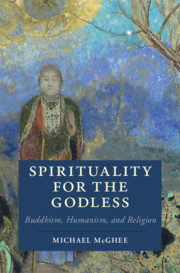Book contents
- Spirituality for the Godless
- Cambridge Studies in Religion, Philosophy, and Society
- Spirituality for the Godless
- Copyright page
- Dedication
- Epigraph
- Contents
- Acknowledgements
- A Shakespearean Prologue
- Introduction
- 1 ‘A Spiritually Enlightened Individual’
- 2 ‘The Resources of a Much Earlier Phase of the Tradition’
- 3 The Distractions of Baruch Spinoza
- 4 Immanuel Kant: ‘To Regard as Petty What We Are Otherwise Anxious About’
- 5 Wittgenstein’s Cool Temple
- 6 Rilke, Shakespeare … and a Little Freud
- 7 Concealment and Revelation
- 8 Mindfulness and the Form of a Philosophical Life
- 9 Epictetus: ‘The Beginning of Philosophy …’
- 10 Ted Hughes: Evaporation, Translation, Translocation
- 11 Philosophy as an Inventive Convergence of Methods
- 12 Richard Norman: ‘The Truths It Contains Are Human Truths’
- 13 Perspectives: Marmalade Stains on the Breakfast Table
- 14 David Hume: Wanting the Natural Sentiments of Humanity
- 15 ‘What is the Difference between Love and God’s Love?’
- 16 ‘Peace, Wild Wooddove, Shy Wings Shut’
- 17 ‘Only a Little Snivelling Half-Wit Can Maintain That’
- 18 ‘The World Is Too Much with Us’
- 19 Of Self and SELF, of Ātman and Anātman
- 20 ‘I Am Myself Alone’
- 21 The Five Heaps or Skandhas
- 22 ‘We Claim That There Is a Person, but We Do Not Say That He Is an Entity’
- 23 Birds, Frogs, and Tintern Abbey
- 24 Human Resources and Hubris
- References
- Index
12 - Richard Norman: ‘The Truths It Contains Are Human Truths’
Published online by Cambridge University Press: 18 June 2021
- Spirituality for the Godless
- Cambridge Studies in Religion, Philosophy, and Society
- Spirituality for the Godless
- Copyright page
- Dedication
- Epigraph
- Contents
- Acknowledgements
- A Shakespearean Prologue
- Introduction
- 1 ‘A Spiritually Enlightened Individual’
- 2 ‘The Resources of a Much Earlier Phase of the Tradition’
- 3 The Distractions of Baruch Spinoza
- 4 Immanuel Kant: ‘To Regard as Petty What We Are Otherwise Anxious About’
- 5 Wittgenstein’s Cool Temple
- 6 Rilke, Shakespeare … and a Little Freud
- 7 Concealment and Revelation
- 8 Mindfulness and the Form of a Philosophical Life
- 9 Epictetus: ‘The Beginning of Philosophy …’
- 10 Ted Hughes: Evaporation, Translation, Translocation
- 11 Philosophy as an Inventive Convergence of Methods
- 12 Richard Norman: ‘The Truths It Contains Are Human Truths’
- 13 Perspectives: Marmalade Stains on the Breakfast Table
- 14 David Hume: Wanting the Natural Sentiments of Humanity
- 15 ‘What is the Difference between Love and God’s Love?’
- 16 ‘Peace, Wild Wooddove, Shy Wings Shut’
- 17 ‘Only a Little Snivelling Half-Wit Can Maintain That’
- 18 ‘The World Is Too Much with Us’
- 19 Of Self and SELF, of Ātman and Anātman
- 20 ‘I Am Myself Alone’
- 21 The Five Heaps or Skandhas
- 22 ‘We Claim That There Is a Person, but We Do Not Say That He Is an Entity’
- 23 Birds, Frogs, and Tintern Abbey
- 24 Human Resources and Hubris
- References
- Index
Summary
If the old picture is shattered, then we lose our bearings, and the question arises, how do we emerge from this disarray, particularly when there is no longer much sense of disarray, no sense that something is missing.
In Transformations of Mind, I drew on a distinction made by Heidegger between Bildung and Besinnung. He conceived the former, Bildung, as providing an established framework or model of personal and social improvement or development, one that is received without question, so that we know already what counts as wisdom and virtue, for instance, or at least have a received view about the direction in which to proceed. But this is not our situation. We have to reassemble what we can from the fragments as we cast around among the debris. It isn’t even as though we have an independent grasp of what counts as moral improvement outside this framework.
- Type
- Chapter
- Information
- Spirituality for the GodlessBuddhism, Humanism, and Religion, pp. 78 - 84Publisher: Cambridge University PressPrint publication year: 2021

